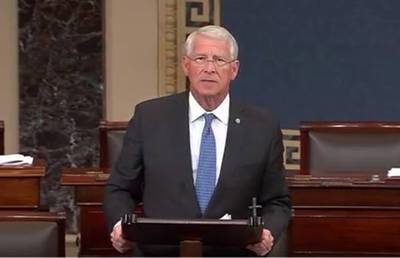Speaking in front of the Senate, U.S. Senator Roger Wicker, R-Miss., Chairman of the Senate Seapower Subcommittee, said the requirement for a 355-ship Navy is clear, especially in light of the recent, fatal accidents involving the USS Fitzgerald and USS John S. McCain.
In response to these incidents, the Chief of Naval Operations, Admiral John Richardson, directed that a comprehensive review take place. On Tuesday, Wicker and other members of the Senate Armed Services Committee have been briefed on those findings. The Navy is scheduled to make the review public later this week.
“The review makes it clear that we are not doing right by our sailors, or the Navy, or the taxpayers in terms of making sure these brave men and women have what they need. We need to work quickly with the Navy here in Congress to implement the recommendations that will be coming forward later this week,” Wickers said.
“We need to enhance training and readiness, and we need to recognize that the size of the fleet has contributed to the problem. Simply put, we need to acknowledge that the Navy has a supply-and-demand problem. We are asking too few ships to do too many things for American security, and that needs to be rectified.”
Wicker is the lead author of legislation to make it the policy of the United States to achieve a 355-ship fleet, based on the Navy’s force requirement. The SHIPS Act is included in both the House- and Senate-passed versions of the
National Defense Authorization Act, which is awaiting action by a conference committee.
“The U.S. military’s combatant commanders have identified 18 maritime regions where the Navy must secure American interests. Our current naval strategy is designed to command the seas in those regions. The Navy needs a minimum of 355 ships to get this done. If the Navy cannot get the bare minimum it needs, then our naval strategy must change, and I can assure you it would be a change for the worse. Instead of a global command of the seas, what we get would be a new, weaker strategy,” Wicker said today.
“I know my colleagues in Congress want a different future. In fact, I am hopeful we can take the first steps this year toward building up the fleet. As former Navy Secretary John Lehman told our subcommittee, President Reagan ‘reaped 90 percent of the benefits of his rebuilding program … in the first year.’ It made it clear that President Reagan, Congress, and the Pentagon were serious about rebuilding the fleet. It sent a signal to our allies and the Soviets that the American Navy was coming back in a big way.”
“I was disappointed to hear that Acting Undersecretary Thomas Dee, an Obama holdover, say last week that 355 ships is probably out of reach until the 2050s. Mr. Dee’s pessimism about the Navy’s own requirement is perplexing, when it is incumbent on the Navy to develop fleet buildup options within budget constraints. Those ‘current and likely future fiscal environments’ were accounted for in the Navy’s 2016 Force Structure Assessment (FSA) of 355 ships.”
“CNO Richardson’s white paper on the Future Navy notes that we ought to achieve a 355-ship fleet in the 2020s, not the 2040s or 2050s. Thank goodness for the foresight and positive attitude of the Chief of Naval Operations. He’s right: A 355-ship fleet should be our goal for the next decade. Regrettably, Acting Undersecretary Dee must have been asleep for the past nine months while Congress was talking about this and while we are on the verge of enacting legislation making a 355-ship Navy the official policy of the United States of America.”
“As O’Brien and Hendrix write, ‘navies and international influence go hand in hand.’ A smaller Navy means a smaller role for America, and we cannot afford that. We must cultivate the national will to avoid this fate. I urge my colleagues to help me in an effort to begin rebuilding our naval power.”
See Wicker deliver his full remarks
here.











